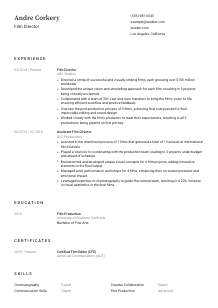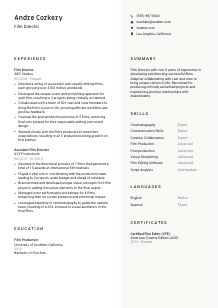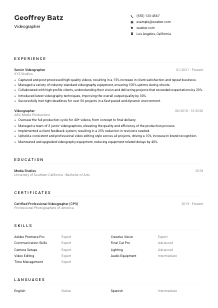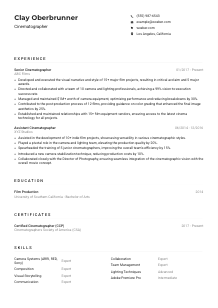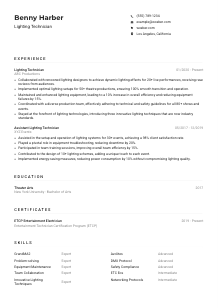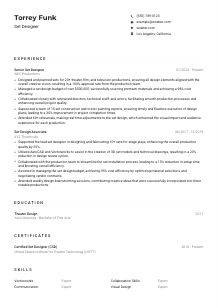Film Director Resume Example
Calling the shots, but your resume isn't in focus? Dive into this Film Director resume example, framed with Wozber free resume builder. Discover how to spotlight your creative vision to align with job expectations, making your directorial career the blockbuster it's destined to be.
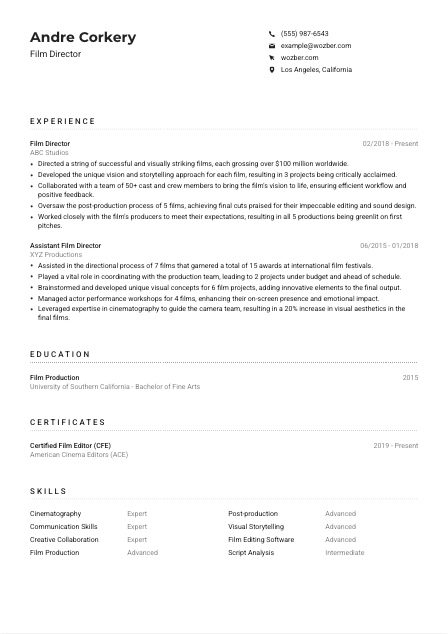
How to write a Film Director Resume?
Hello, aspiring Film Director! The path to clinching your dream role isn't just about directing on set; it begins with directing attention to your resume. In the realm of film where every frame counts, think of your resume as the opening scene of your career.
With the help of the Wozber free resume builder, this guide is custom-framed to direct your resume creation process—tailoring it exquisitely to fit the Film Director job description. Let's roll the camera and action into building a resume that's not just ATS-compliant but one that steals the spotlight.
Personal Details
Your personal details section is the title sequence of your career narrative. Let's ensure this introduction sets the stage for a memorable impression, harmonizing with the Film Director position's spotlight.
1. Name in Lights
Think of your name as the marquee—it's the first thing the audience sees. Make it stand out with a clear, legible font. Just like in film credits, the director's name has a prime position; ensure yours does too on your resume.
2. Role Title as Your Genre
"Film Director"—show it just below your name, crystal clear. Like choosing the right genre for a movie, aligning your title with the job you're applying for sets the tone and expectation right from the start.
3. Communication Channels
Ensure your contact details are the equivalent of a clear-cut trailer—brief yet informative. A professional email and a dynamic phone number where you can be reached are like the release date info—vital for the audience to know.
4. Location, Location, Location
In film, setting is everything. The same goes for your resume. "Los Angeles, California" not only matches the job's geographical requirement but sets the scene that you're in the heart of the industry.
5. A Link to Your Portfolio
A director's work speaks through their portfolio. Include a link to your professional website or reel, ensuring it's updated and reflective of your best work—the critics (hiring managers) will appreciate this sneak peek.
Takeaway
Just as every film begins with a captivating title sequence, your personal details section should captivate the hiring manager's interest. Tailor it with precision, ensuring it's professional and seamlessly aligns with the Film Director role. This is your first cut—make it award-winning.





Experience
A Film Director's experience section is the feature presentation of their resume, showcasing the box office hits and critically acclaimed projects. Let's script this section to reflect your directorial achievements, tailor-made for the job description.
- Directed a string of successful and visually striking films, each grossing over $100 million worldwide.
- Developed the unique vision and storytelling approach for each film, resulting in 3 projects being critically acclaimed.
- Collaborated with a team of 50+ cast and crew members to bring the film's vision to life, ensuring efficient workflow and positive feedback.
- Oversaw the post‑production process of 5 films, achieving final cuts praised for their impeccable editing and sound design.
- Worked closely with the film's producers to meet their expectations, resulting in all 5 productions being greenlit on first pitches.
- Assisted in the directional process of 7 films that garnered a total of 15 awards at international film festivals.
- Played a vital role in coordinating with the production team, leading to 2 projects under budget and ahead of schedule.
- Brainstormed and developed unique visual concepts for 6 film projects, adding innovative elements to the final output.
- Managed actor performance workshops for 4 films, enhancing their on‑screen presence and emotional impact.
- Leveraged expertise in cinematography to guide the camera team, resulting in a 20% increase in visual aesthetics in the final films.
1. Script Analysis
Divide the job description into scenes—identify keywords and experiences. Relating these specific elements within your experience helps in considering your resume for the role, akin to fitting a script to a director's vision.
2. Set Decor and Lighting
Structure is akin to setting the stage. For each role you've held, illuminate your job title, the production (company), and the duration of your directorship. This clear, chronological layout gives your resume a natural flow.
3. Capturing the Scene
Narrate your accomplishments in each role with dynamic action verbs. Just as a director commands, "Action!" your resume should highlight your directive prowess, such as overseeing critically acclaimed films or managing multimillion-dollar budgets.
4. Frame It
Whenever you can, quantify your achievements. Perhaps your films have grossed over $100 million worldwide or captivated audiences at international film festivals. These numbers are your box office stats, proving your success.
5. Editing Room
Keep the storyline relevant. As much as a scene might be beautifully shot, if it doesn't serve the story, it's cut. Similarly, streamline your experience to relevant roles and achievements that spotlight your suitability for the Film Director position.
Takeaway
Crafting a captivating Experience section is akin to directing a hit film: it requires attention to detail, clear structure, and relevance to the audience. Tailor your directorial achievements to the role, ensuring each bullet point serves the narrative of why you're the best fit for the director's chair.
Education
In the realm of film directing, your education is the screenplay that laid your foundation. It sets the stage for your narrative journey, echoing the qualifications sought by the job listing. Let's ensure this part of your resume narrates a compelling backstory.
1. The Opening Credits
Identify the education creds listed in the job requirements, like a "Bachelor's degree in Film Production, Fine Arts, or a related field." This isn't just a script requirement; it's your ticket to the audition.
2. Scene Composition
Frame your educational achievements succinctly: degree, field of study, institution, and graduation year. Like setting the stage for a crucial scene, clarity and positioning are key.
3. Depth of Field
Should your education closely mirror the job spec, such as a "Bachelor of Fine Arts in Film Production," highlight this with the due prominence it deserves. It's the perfect plot twist that aligns your story with the studio's (employer's) vision.
4. The Subplots
Relevant coursework, workshops, or thesis projects act as subplots enriching your main narrative. Though our featured resume didn't require this detail, remember that in early career stages, these elements can add layers to your educational storyline.
5. The Supporting Cast
Other notable mentions—honors, extracurriculars, or film projects—serve as your supporting cast. These details, when aligned with the role's scope, enhance your narrative, especially if they demonstrate leadership or creative initiative.
Takeaway
Your education section isn't just a list of schools and degrees; it's the foundational layer of your career storyline. Tailor it to reflect not just your qualifications but your character depth and thematic alignment with your desired Film Director role.
Certificates
In your directorial quest, certifications are like the special screenings—unique accolades that elevate your professional portfolio. Even if the job description doesn't specify them, well-chosen certificates can spotlight your continuous learning and expertise.
1. Casting the Right Certificates
Start with certificates that resonate with the job's demands. Think of them as your filmography—each selected piece should add value to your professional narrative.
2. Premiere Dates
For certificates of recent completion or those with validity periods, the 'release date' is crucial. It demonstrates your commitment to staying relevant and updated in the ever-evolving film industry.
3. Festival Circuits
Regular updates to your certifications section reflect your career's festival circuit—always moving, evolving, and gaining recognition. Continuous learning is as vital as film festival accolades in showcasing your dedication to craft.
4. The Box Office Hit
Our resume example mentioned the "Certified Film Editor (CFE)"—a title that hints at technical prowess and specialization. Pinpoint certifications that bolster your directorial bid, ensuring they echo the job's technical and creative demands.
Takeaway
Your certifications are the highlight reel of your professional development. Like selected film awards, they underscore your expertise and adaptation to industry trends. Align them with the job's demands, making each certificate count in your career storyline.
Skills
The Skills section of your resume is where you get to showcase your directorial toolkit. It's a candid reveal of your professional attributes, both technical and interpersonal, tailored to mesh seamlessly with the job description. Let's frame it to spotlight your expertise.
1. Script to Screen
Start by decoding the job listing for both explicit and implicit skills. Whether it's "expertise in cinematography" or "outstanding interpersonal and communication skills," these keywords are your script, guiding the skills you'll spotlight.
2. The Director's Cut
Match your skills with those called out in the job description, focusing on the most relevant. This selective process is akin to the director's cut, ensuring only the most impactful scenes (skills) make the final cut (resume).
3. Behind the Scenes
Avoid overloading this section with every skill you possess. Like an eloquent screenplay, brevity and relevance are key. Carefully chosen skills articulate your fit for the role better than a crowded list ever could.
Takeaway
Your skills section is the link between your past accomplishments and future potential. Craft it as a compelling showcase of what you bring to the director's chair, making every skill listed a testament to your readiness for action.
Languages
In the global film industry, linguistic skills can open doors to cross-cultural projects and enrich storytelling. Even if the role emphasizes "High proficiency in English," showcasing additional languages can underscore your versatility and global mindset.
1. Screening the Script
Scan the job requirements for any specified language needs. If English is a must, prioritize it, showcasing your adeptness in the primary language of the film industry.
2. Dubbing and Subtitles
List any additional languages you speak, positioning this linguistic diversity as an asset. Each language is a new market, a fresh audience—highlight your ability to navigate these with ease.
3. Rating System
Be honest about your proficiency levels. Whether you're "Native" in English or "Fluent" in Spanish, clear labels help the hiring manager understand your communicative breadth—a key skill in collaborative storytelling.
4. The International Co-Production
Languages are your passport in the international film scene. Even if not explicitly required, they signal your ability to work in diverse settings, underscoring your role as a global film director.
5. Language in Action
Your linguistic skills are not just about dialogue; they're about connection. Each language you list is a potential storyline, a character you can authentically depict. It's not just about speaking; it's about understanding and conveying the human experience.
Takeaway
Leverage your multilingual abilities as a distinctive asset in your directorial toolkit. Like the versatile director who can navigate multiple genres, your languages open up a world of narratives, ready for you to explore and bring to the screen.
Summary
Your resume's summary is the logline of your directorial career. It should encapsulate the essence of your professional narrative, hooking the hiring manager's interest and compelling them to dive deeper into your story. Let's craft a teaser that captivates.
1. The Pitch
Start with an engaging introduction that sets the tone. Like any good logline, your summary should capture the essence of your expertise and the uniqueness of your directorial style.
2. The Cast
Highlight the star qualities—key skills and achievements that define your career. These are your lead actors, drawing the reader into your story. Show them why you're not just another director but the visionary they're seeking.
3. The Plot Twist
Inject your career highlights that resonate strongly with the job's requirements. This twist in the tale underscores not just your fit for the role but emphasizes the unique narrative you bring to the table.
4. The Climax
Keep it concise yet impactful. Like any memorable film, your summary should leave the audience (hiring managers) wanting more, eager to delve into the depth of your career screenplay.
Takeaway
Your summary is the spotlight moment before the curtain rises—a concise yet compelling introduction that sets the stage for your career narrative. Craft it with care, letting it reflect your unique directorial vision and expertise, inviting the reader into your world.
Cut! That's a Wrap
With these curated guidelines, your resume is now ready to take center stage in the competitive casting call for Film Directors. By harnessing the power of the Wozber free resume builder, integrating ATS-friendly resume templates, and fine-tuning every detail for ATS optimization, your resume is not just a document—it's a ticket to your next blockbuster project. Remember, in the theatre of your career, you are both the director and the star.
Action your ambition, focus your lens, and let your resume be the showreel that commands the spotlight. The set is ready, the cameras are rolling—your directorial debut awaits.

- Bachelor's degree in Film Production, Fine Arts, or a related field.
- Minimum of 5 years experience in directing films or other visual media.
- Proven track record of directing successful and critically acclaimed projects.
- Expertise in cinematography and the technical aspects of film production.
- Outstanding interpersonal and communication skills to effectively collaborate with cast and crew.
- High proficiency in English necessary.
- Must be located in Los Angeles, California.
- Develop the overall vision for each film, including storytelling, aesthetics, and performance.
- Work closely with the production team to ensure the film stays within budget and on schedule.
- Direct and guide actors in their performances to achieve the desired emotional effect.
- Oversee the post-production process, including editing, scoring, and sound design.
- Collaborate with the film's producers and stakeholders to ensure the project meets their expectations.





